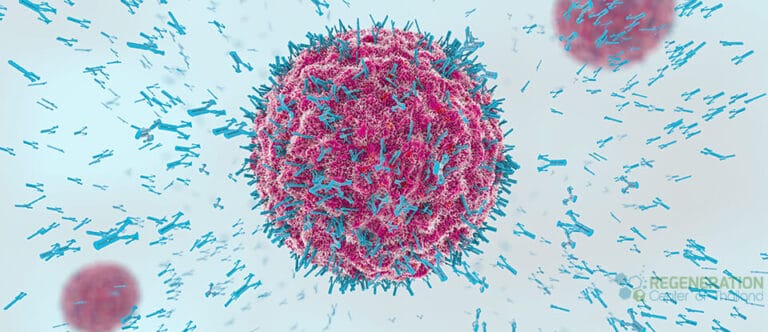
Cancer patients with abnormal metabolism apoptosis evasion are considered to be hallmarks of many types of cancers. Cancer research has shown that cancer stem cells are often the key drivers of tumor formation, cancer progression, and recurrences. To successfully defeat malignant cells, therapies must eliminate cells that are resistant to apoptosis.
Cancer stem cells or “CSC” are unipotent cells that are found within a tumor cell mass. These cells are very resistant to traditional chemotherapies and play an integral role in the recurrence of cancers after chemotherapy. CSCs can change their metabolism to fill their biosynthetic requirements. These cells are very dependent on aerobic glycolysis for energy production and are associated with rapid increases in the synthesis of fatty acids and the rate at which glutamine is utilized. The Regeneration Center has found consistent evidence that shows therapeutic resistance to cancer treatments can increase due to glutaminolysis, fatty acid synthesis, peptide bonding & dysregulation in glucose metabolism.
Cancer cells can propagate their lethal effects to survive after chemo by optimizing their metabolic requirements to ensure evasion from the host immune system. Current evidence shows that cancer stem cells can rapidly metabolize glutamine to grow because glutamine provides energy and vital precursors needed to synthesize lipids, proteins, and nucleic acids. CSC can also control some cell signaling pathways that control the rapid proliferation of cancer cells.
All cells in the human body get energy through the mitochondria, dependent on glucose (sugar) and oxygen. Cancer stem cells can draw energy from either source. In a dormant state, cancer cells use glucose, but in a proliferative state, it requires more oxygen. The ideal way to treat cancer cells is to block mitochondria and block the path used for glucose uptake.
Instead of using toxic chemicals to kill cancer cells, it might be possible to use its metabolism to kill Cancer. The immune system is regulated by our metabolism, which suggests that the possibility of combining immunotherapy with anti-cancer cell therapies can be effective in eliminating the progression of some types of cancers, including pancreatic cancer, liver cancer, lung cancer, and prostate cancer.
Successful elimination of Cancer today requires an approach that can affect CSCs and differentiated cancer cells. Conventional therapies that can target rapidly proliferating differentiated cancer cells include radiotherapy, chemotherapy, NK Cells and cancer immunotherapy. This modern cancer treatment can help tumors shrink but might not be able to prevent the recurrence of the tumor.
For this reason, a combination treatment that can target proliferating cancer cells and dormant cancer cells is ideal. An essential component for combined cancer therapy is identifying surface markers that can distinguish cells between nontumorigenic cells & tumorigenic cells.
Therapeutic strategies for cancer cells include targeting the cellular pathways involved in the cell self-renewal process & cellular differentiation. A reversal of the tumor metabolism to “normal” from “malignant” can help stop the growth of cancer cells, create tumor regression, and induce apoptosis of cancer cells, thus reducing the risk of any recurrence of the tumor.
If you've seen people take ice baths or cold showers and wondered if they're onto… Read More
Immunomodulation stands at the forefront of biomedical research, steering the immune system's ability to fight… Read More
Stem cell research leads the charge in medical innovation, heralding revolutionary advances in regenerative medicine.… Read More
The blood-brain barrier (BBB) is a crucial shield for the brain, regulating the entry of… Read More
While peptide bonds are fundamental to protein structure, their direct relationship with stem cells lies… Read More
When discussing cutting-edge cancer treatments, NK cell therapy stands out due to its unique approach… Read More